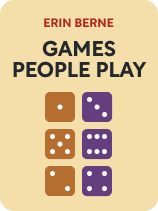

This article is an excerpt from the Shortform book guide to "Games People Play" by Eric Berne. Shortform has the world's best summaries and analyses of books you should be reading.
Like this article? Sign up for a free trial here .
Why do people play mind games? Do they serve a purpose?
At some point in your life, you’ve most likely encountered somebody who likes to play mind games. According to psychiatrist Eric Berne, we all play mind games on each other—it is a normal phase of psychological development.
Here’s why we play mind games and why these games matter.
Mind Games Serve Several Important Purposes
Because real intimacy is either unavailable or too terrifying to us, Berne says, we spend most of the time in our serious relationships playing games.
He argues that despite the negative aspects of games, they provide important benefits. They’re also a normal phase of psychological development—we all learn to play games, and growing past them is like a sapling becoming an oak.
Below, we’ve broken down the main advantages that games provide.
1. Games Keep Us in Balance
Why do people play mind games? Well, we all need social recognition to remain healthy. Playing games gets us that, because games are social. Remember that any amount of social contact is better than none at all—it’s a biological concern. And so games maintain our baseline health even though they don’t support higher well-being.
Similarly, each time a game confirms one of your stances, it stabilizes your belief system. This confirmation helps you feel secure in who you are and how you relate to the world, Berne says.
(Shortform note: The implied argument here is that someone in solitary confinement would do worse than someone in an abusive relationship. There are caveats that Berne doesn’t mention: Solitary confinement may predictably drive you crazy, but abuse can escalate rapidly. Verbal abuse may suddenly become physical; a slap can become a gunshot. So when it comes to abusive situations, games may keep you alive in theory, but real life is more complex than that. Further, a healthy degree of solitude can help you clear your mind, enrich your inner life, and work through tough problems without distraction.)
For psychologically unstable individuals, Berne states, the belief-stabilizing function of games is often essential to maintaining their sanity. If such an individual’s game is broken up, they may experience a serious existential crisis.
Say Player A believes that “All others must show me respect.” One day, his kid steps out of bounds and A blows up on them. But the kid unexpectedly holds her ground, which challenges Player A’s whole self-image. Lacking the capacity to process this, A may “short-circuit” psychologically.
Because of this risk, Berne says, always consider how stable you or another is before you try to break any games.
| Narcissism May Exemplify Unstable Game-Playing Many of those who display narcissism demonstrate Berne’s warning about unstable individuals. Narcissists are prone to fits of rage, which often trigger when those close to them threaten the narcissist’s inflexible, fragile sense of self. Some research has found that “vulnerable” narcissists lack much resilience, which seems to support Berne’s assertion. Yet the same study found that “grandiose” narcissism correlates positively with resilience, leading to greater mental toughness in people with an inflated sense of superiority. A third variety, histrionic narcissism, seems to fit the bill. Histrionic narcissists are prone to rage and intense emotional drama, mainly when they feel they aren’t receiving the attention and validation they want. Berne might say: By denying them that stroking, you’ve threatened their fragile self-image and destabilized their existence. |
2. Games Keep You in the Comfort Zone
Your games are habits: They’re second-nature patterns that you default to using. Developing beyond existing habits is typically uncomfortable, requiring both psychological and behavioral growth. Games provide just enough satisfaction to keep us happy, so many never try to grow past them.
For example, if you play “It’s Just Too Hard,” you may consistently avoid taking necessary steps in your personal development. Each time your game confirms that “It’s just too hard,” you get more comfortable with settling, and the discomfort of growth becomes even less appealing. This is an inner benefit of games: They keep you from having to live effortfully.
Games also help you avoid the external, real-world experiences that, according to Berne, you’re unconsciously afraid of. For example, “It’s Just Too Hard” might help you avoid developing some new skill—like practicing public speaking on-stage.
(Shortform note: Positive Psychology discusses how leaving the comfort zone is essential to growth, lending support to Berne’s implication that games generally keep us stagnant. On the other hand, our comfort zones are where we rejuvenate and relax. The key is to balance it: Push your limits, then rest, and gradually expand your capacities. In The Art of Learning, Josh Waitzkin argues for an incremental approach to growth, as above. Just as you can overdo physical exercise and injure yourself, you might also cause yourself undue anxiety if you’re overly focused on changing. Healthy growth, Waitzkin argues, comes from a foundation of psychological well-being, which you can find by practicing acceptance of your emotions.)
3. Playing Games Structures Our Close Relationships
Your games substitute for real intimacy, Berne states. Most of us either can’t handle intimacy or have no opportunities to experience it. So instead, we play games. They’re rewarding enough to maintain our baseline health, even if they aren’t as fulfilling as intimacy.
The games you play in your closer relationships also give extra “advantages” in your casual relationships. Berne says that “Let’s You and Him Fight,” where a woman causes two men to fight over her, gives her two advantages. First, she gets to feel desirable. Second, she gets to chat about it with her friends—and that small talk is a secondary benefit of the game.
(Shortform note: While Berne doesn’t explain this in Games People Play, outside sources describe his forms of social time—withdrawal, rituals, small talk, activities, games, and intimacy—as choices for interaction along a spectrum of intensity. When you’re less familiar with someone, you’ll order that social time with pastimes. When you’re more comfortable with someone, you may start to relate to them through activities. Games come into play as our main way of structuring our close relationships. Further along lies intimacy, which corresponds strongly with personal need fulfillment. This seems to indirectly corroborate Berne’s intuition that games constitute a lesser form of relationship.)
Why Games Matter
Games play a more significant role in our lives than we realize. Since we’re typically unconscious of them, they can impact us in ways we don’t understand. For example, you might feel confounded by an inability to build a lasting relationship. This could be due to a game you’re playing!
Berne gives several reasons to explain the “so what?” of games, which we’ve distilled below along this theme: Games quietly influence how our lives unfold, often beneath our awareness. Unless we notice them and learn to change them, we’ll get stuck in patterns we never chose for ourselves.
#1: Your games are your inherited relational style. They come from at least as far back as your grandparents, Berne says, and possibly up to 100 years. They’re how you deal with discomfort and how you relate to the people closest to you (even if it’s by arguing over dinner spots). You express your characteristic emotions through your games—for example, Mr. Vesuvius’ outburst-game is a major part of who he is.
So if you’re unaware of your games, you probably don’t have a great handle on how you habitually relate to others. Or of the emotional palette and patterns that compose your life. Becoming aware of them is the first step toward more consciously shaping that social-relational style.
(Shortform note: One study found that nurture, more than nature, appears to predict adult attachment styles. This seems to support Berne’s case: That how we’re raised, more than genetics (he doesn’t mention this) determines how we relate to others. On the other hand, consider that your family’s inherited games are like your “emotional genetics”: traits and habits that persist through many generations. If we’re raised through persistent, inherited habits, is “nurture” much different from the inherited “nature” of our genes? This likely depends on whether your parents strictly followed what they were given, or broke off and developed their own perspectives. But could that inclination to individuate also be an inherited, nature-set tendency?)
#2: You may unknowingly pass your games on. Much of raising children, Berne says, happens as we unconsciously teach children our games. Children imitate their parents, so if they see you berating the dog when you spill soup, they’ll absorb that—“when something upsetting happens, dump your frustration onto vulnerable others.”
Becoming aware of your games is therefore a significant opportunity to break your family’s negative cycles. Maybe you’ve inherited a dysfunctional relationship with anger, or crippling shyness, or mildly narcissistic tendencies—we all get something that’s not great. But if we can notice these (and learn to change them), we put ourselves in a position to raise healthier children.
(Shortform note: This is much like the idea of generational curses: Repeated stories and behaviors pass from parents to children, such that the kids live lives similar to their parents’. Breaking these can help us to be more than just a “chip off the old block,” freeing us to develop in our own directions. The difficulty is that our education skips over “How to Grow 101,” leaving most to learn how to overcome unhealthy habits, and form new ones, on their own. The habit loop—James Clear explains a habit as a cycle of cue → craving → response → reward—is one piece of the puzzle. When wielded with sufficient self-awareness, it can enable you to untangle inherited habits and, as Clear explains, to reshape your identity to support new behaviors.)
#3: Your games determine who enters your life. Your close social circle and your intimate relationships are both made up of people who mesh with your games, Berne says. But maybe yours aren’t too healthy, so you keep ending up in failed relationships, or you find that old friendships feel frozen in time. Maybe your games are holding you back, and you aren’t even aware of them.
We inherit our games but they don’t fully reflect our unique personalities, Berne says. So we can infer that if you form relationships according to games you didn’t consciously choose, those relationships won’t really match you either. So again, learning your games and reshaping those habits puts you in a better position to live consciously, as opposed to being governed by unconscious, inherited forces.
(Shortform note: A 2016 study found that “opposites attract” actually isn’t true. In contrast, Berne’s view seems accurate—the study’s authors say that we choose partners who are very similar to us. When we meet a potential partner, we look for shared values and common ground. We also look for shared behavioral tendencies, like Berne suggests. The more connections we can find, the more we’ll trust that person, and feel that we can cooperate with them toward shared goals. Picking your partner based on these similarities is so common, they say, that it’s practically a “psychological default.”)

———End of Preview———
Like what you just read? Read the rest of the world's best book summary and analysis of Eric Berne's "Games People Play" at Shortform .
Here's what you'll find in our full Games People Play summary :
- The many ways that we relate to one another through “games”
- Why you might be missing out on the fulfillment of game-free living
- How to identify and overcome unhealthy games






